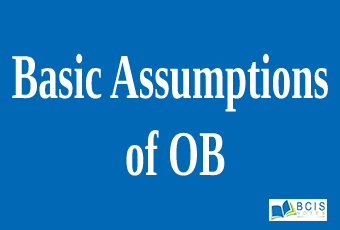
Basic Assumptions of OB
Basic assumptions of OB include the nature of people and the nature of organizations. The assumptions in general mean core principles of OB. They are individual differences, a whole section, motivation, the value of the person from people’s point of view and, social systems, and mutual interests from organizations’. It OB studies the organization which is composed of people and organizations.
Basic assumptions of OB:
Nature of people:
- Individual differences,
- A whole section,
- Caused behavior(motivation),
- The value of the person
Nature of organizations
- Social systems, and
- Mutual interests
Nature of people:
1. Individual differences:
The nature of an individual is so different from one another. Though people differ in almost everything like attitudes, personality, skills, and so on. The concept of individuality has come from psychology.
It is influenced by different factors like:
- Learning
- Perception
- By birth or Inherited property
- The environment around the individual
- Motivation
- Culture, etc.
Human resource managers need to consider these differences and should be able to understand what s/he wants. The wants and motivations which work for one individual don’t mean that the same wants and motivations will fulfill the other ones. So, managers have the challenge to completely understand what is important for these particular individuals and what is not.
Learning habits and perceptions vary from one to another person. So, managers should be able to satisfy the type of leadership and perception of staff. Then, only those staffs can work properly.
2. A whole section:
This concept signifies that the behavior of a personal work can’t be taken in isolation. When an employee comes to the work station as a complete person, s/he has his/her background, sentiments, emotions, feelings, etc. which cannot be separated from the skills they are using on the job. Employees carry with them the problems of their private lives. Similarly, their home life is influenced by their work life. Therefore, the managers and to help an all-round development of the man rather than a particular aspect of a person.
3. Caused behavior (motivation):
According to psychologists, human behavior is caused, motivated, and goal-directed. It is the situation that stimulates a person to behave in a given manner. People’s behavior is caused by needs that can be directed and controlled to get desired results. Therefore, managers need to motivate employees and determine what managerial action satisfy human needs and what actions threaten their need fulfillment
4. Value of the person (human dignity):
This concept tells that people should be treated differently as compared to other resources in the organization. People’s feelings, aspirations/desires, sentiments, skills, etc. should be recognized in organizations. People should be treated with respect, dignity, and equity. They must not be treated like an animal or a machine. Managers must recognize and exercise value system
B. The Nature of Organization
This category contains two basic assumptions about the organization. They are:
- Organizations are social systems, and
- They are formed based on mutual interest.
5. Social systems:
Social scientists say that organizations are social systems. They are governed by social and psychological laws or rules. The social system coordinates the activities of its members for the achievement of common goals. People are social beings. People have many social and psychological needs; they enjoy different statuses and play different roles. People’s behavior is influenced by their own needs as well as organizational goals.
Within a formal social system, there also exists an informal social system. Every sub-system influences other sub-systems and is influenced by every other part. Organizations are dynamic in nature. The idea of a social system provides a framework for analyzing organizational behavior issues. It helps make organizational
6. Mutual interest:
This concept is represented by the statement that “organizations need people and people also need organizations.”
Employees need organization as a means to achieve their goals and organizations need people to achieve organizational goals. The interest of both parties must be protected. Both organizations and people are benefited from their association. The mutual interest provides a super-ordinate goal (combined goal) that integrates the effects of individuals and groups.
Mutuality of Interest (Superordinate Goal)
Note: Employee goals, Organizational goals make together Superordinate Mutual Employee makes the mutual accomplishment of goals, which are fruitful for both the employee and organization definitely.
When the six fundamental concepts of OB are considered together, they provide a holistic concept of the subject. Holistic organizational behavior interprets people-organization relationships in terms of the whole person, whole group, whole organization, and whole social system. Issues are analyzed in terms of the total situation affecting them rather than in terms of an isolated event or problem.
You may also like Introduction to Organizational Behavior.
If you liked our Html Editor, also follow us on Facebook: Bcis Notes.

Leave a Reply